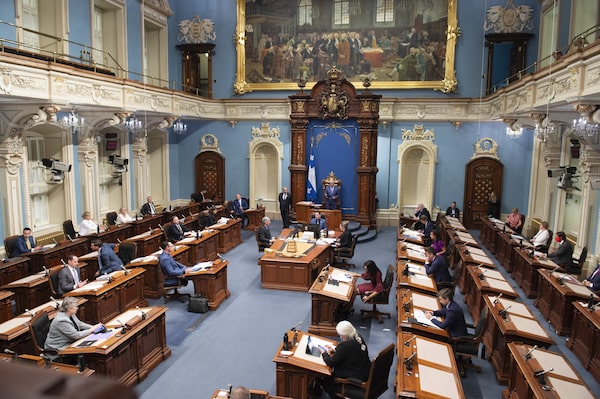
The National Assembly sits for question period on June 12, 2020 at the legislature in Quebec City. A second provincial party courting Quebec anglophones, minorities and federalists has arrived on the political scene in the province.Jacques Boissinot/The Canadian Press
A new provincial political party courting Quebec anglophones, minorities and federalists arrived on the scene Tuesday — the second in less than a week.
The Canadian Party of Quebec describes itself as “a progressive, rights-centred, federalist option.”
Spokesman Colin Standish says the fledgling party is preparing its paperwork for Elections Quebec and will introduce its logo and leader in the coming weeks. The party, he says, is committed to being a provincewide movement, although he adds it expects to draw its core support from English-speaking Quebecers and minority groups.
“Certainly we have a 125-riding strategy,” Standish said in an interview Tuesday, referencing Quebec’s 125-seat legislature. “We see this as a provincewide movement that can potentially appeal to all Quebecers, not just English speakers, but French speakers, the Indigenous community and newcomers.
“We do recognize our core constituencies — English speakers and minority groups — are concentrated in areas in Montreal, the Eastern Townships and western Quebec, and we’ll be paying particular focus to targeted ridings.”
It’s the second party focused on anglophones and minorities to launch ahead of the Oct. 3 provincial election. Failed Montreal mayoral candidate Balarama Holness last week announced his new party, Mouvement Quebec, would also advocate for ethnic and linguistic minorities, particularly in Liberal party strongholds in Montreal.
Liberal Leader Dominique Anglade, whose party’s traditional voter base includes those English and minority communities, says she’s confident voters will ultimately see the Liberals as the best option.
“The Liberal party is the largest tent that there is to support all Quebecers; it doesn’t matter where they come from,” Anglade told reporters Tuesday in Montreal.
For his part, Standish dismissed the notion his party will split the vote among anglophone federalists and minority voters, arguing that more parties and more voices at the ballot box can’t be a bad thing.
“No vote in Quebec can be taken for granted and no political party has a monopoly on a certain riding, a certain group of people or forming government,” Standish said.
Asked about the two potential new parties, Francois Legault said they both seemed to be advocating in favour of a bilingual Quebec, which he said would spell the end of the French language.
“If Quebec is bilingual, unfortunately the attraction in North America to English will be so strong, it will be a matter of time before we don’t speak French in Quebec and we become Louisiana,” Legault said in Quebec City.
Our Morning Update and Evening Update newsletters are written by Globe editors, giving you a concise summary of the day’s most important headlines. Sign up today.